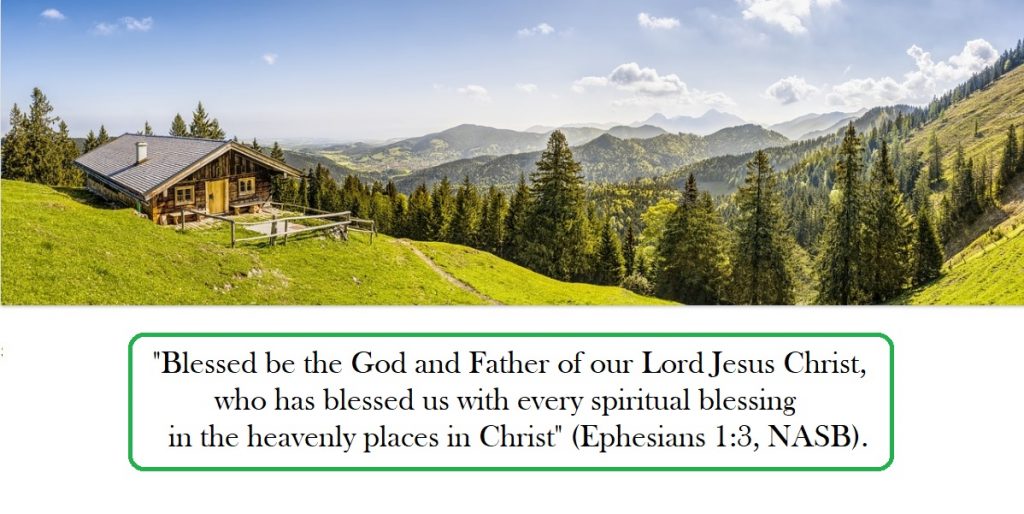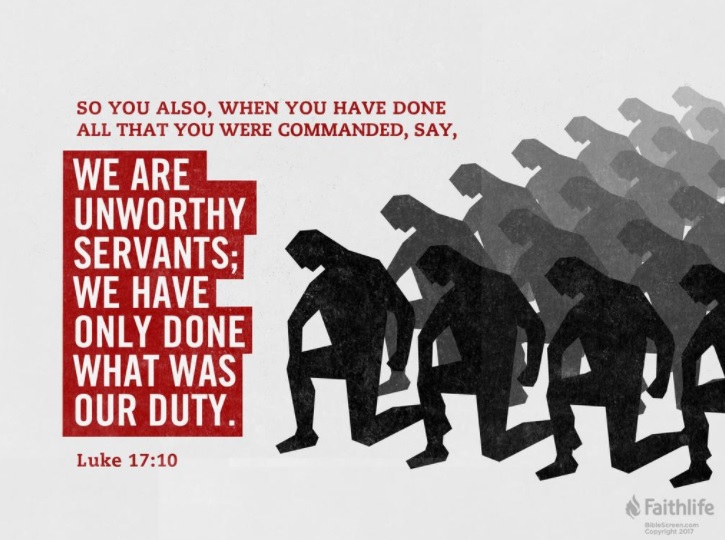“Go therefore and make disciples of all the nations…teaching them to observe all that I commanded you; and lo, I am with you always, even to the end of the age” (Matthew 28:19-20, NASB).
——————–
Contents:
1) “Comfort One Another With These Words” (Jeff Himmel)
2) A Short Lesson about Grace (Frank Himmel)
3) Phariseeism (Frank Jamerson)
4) News & Notes
——————–

-1-
“Comfort One Another With These Words”
Jeff Himmel
The apostle Paul once wrote to some Christians at Thessalonica who were concerned about what happened after death. After allaying their fears with a beautiful description of the final resurrection, he instructed them, “Comfort one another with these words” (1 Thess. 4:18). It is easy for the pressures and problems of life to get us down and make us worry. But God’s word is full of truths that bring great comfort to the soul of every Christian. Jesus spoke many words of consolation to his distressed disciples. His apostles, guided by the Holy Spirit, brought messages of hope and courage to the struggling saints of the early church. The truths of his life, death, and resurrection, as well as his promises to us, are a source of comfort and joy like no other.
1. In Christ we have forgiveness of sins. No greater human problem exists than that of separation from God by sin. Every one of us has fallen short of God’s glory (Rom. 3:9,23). But the wall placed between man and God has been broken down by Jesus’ death. “And you he made alive, who were dead in trespasses and sins, in which you once walked according to the course of this world …” (Eph. 2:1-2). “But God demonstrates his own love toward us, in that while we were still sinners, Christ died for us . . .And not only that, but we rejoice in God through our Lord Jesus Christ, through whom we have now received the reconciliation” (Rom. 5:8,11).
2. In Christ we have joy and peace in life. Many people spend their whole lives searching for something to give them happiness and peace of mind. The writer of Ecclesiastes tried in vain to find satisfaction in the things of this world. He finally realized that serving the Lord is the only thing that brings any real reward: “Fear God and keep his commandments, for this is the whole duty of man” (Eccl. 12:13). Christians should be the happiest people in the world! Instead of worry and anxiety, Christ offers the peace of bringing our requests before God Almighty (Phil. 4:6-7). Rather than sinfulness, hatred, and conflict, the Spirit of God yields love, joy, peace, longsuffering, kindness, goodness, faithfulness, gentleness, and self-control in us (Gal. 5:22-23).
3. In Christ we have hope even in death. People tend to fear death because they don’t know what lies beyond. But the Christian can face life’s end with the knowledge that resurrection to eternal life will follow. The Thessalonians were evidently worried about their brethren who had died. Paul reassures them that because Christ overcame death, those who die in him die in hope: “For if we believe that Jesus died and rose again, even so God will bring with him those who sleep in Jesus” (1 Thess. 4:14). In 1 Corinthians 15, a most glorious picture of the resurrection is painted, one that allows the Christian to face even death with confidence in his Lord: “So when this corruptible has put on incorruption, and this mortal has put on immortality, then shall be brought to pass the saying that is written: Death is swallowed up in victory … But thanks be to God, who gives us the victory through our Lord Jesus Christ” (1 Cor. 15:54,57).
4. In Christ we have the promise of a heavenly reward. Perhaps the greatest comfort that God’s word provides is knowing the reward that awaits us when the difficulties of this life have ceased. In Revelation 21-22, John describes (as ably as possible in human terms) the glory of heaven as he beheld it. I can never read this passage without feeling a stirring in my soul. I am sure it had the same effect on the downtrodden saints to whom John wrote. “And God will wipe away every tear from their eyes; there shall be no more death, nor sorrow, nor crying; and there shall be no more pain, for the former things have passed away” (Rev. 21:4). We can withstand all the storms of life, no matter how severe, with the certain hope that we will one day dwell with God for eternity. “And the city had no need of the sun or of the moon to shine in it, for the glory of God illuminated it, and the Lamb is its light . . . And there shall be no night there: They need no lamp nor light of the sun, for the Lord God gives them light. And they shall reign forever and ever” (Rev. 21:23; 22:5).
— Via Guardian of Truth XXXIX: 1 p. 5, January 5, 1995
——————–

-2-
A Short Lesson About Grace
Frank Himmel
“Which of you, having a slave plowing or tending sheep, will say to him when he has come in from the field, ‘Come immediately and sit down to eat’? But will he not say to him, ‘Prepare something for me to eat, and properly clothe yourself and serve me while I eat and drink; and afterward you may eat and drink’? He does not thank the slave because he did the things which were commanded, does he? So you too, when you do all the things which are commanded you, say, ‘We are unworthy slaves; we have done only that which we ought to have done’” (Luke 17:7-10).
In Luke 12:37, God is depicted as a master doing precisely what Jesus says here a master normally would not do: serving dinner to his slaves. God is indeed gracious! This illustration is a counterbalance to that one, cautioning us not to lose our perspective. It reminds us of two vital points.
First, grace does not do away with obedience. Jesus said we are to “do all the things which are commanded you.” Of course, no one obeys perfectly (Romans 3:23), but we are to try our best. Grace does not give us license to “serve” the Lord however we please, to selectively choose which of His instructions we will obey, or to modify His plans according to our reasoning. We need the servant’s heart. Our wisdom and pleasure must always yield to God’s.
Second, obedience does not do away with grace. Perfect obedience might make something due us (Romans 4:4); but since no one achieves that, whatever we receive is always a matter of grace. After we have done all that we are commanded, we still are unworthy of the blessings God showers upon us. (Some passages, emphasizing faithfulness, do speak of divine blessings as a reward [e.g., Colossians 3:24; 2 John 8], yet even then it is a gracious one.) Surely this fact negates the quibble that says if we must obey God’s conditions (e.g., baptism) in order to be saved, that would make salvation merited. Let’s not lose our balance!
— Via Pathlights, October 11, 2020
——————–

-3-
Phariseeism
Frank Jamerson
The Pharisees were probably condemned more severely than any other group of people by the Lord during His life on earth. The label of “Pharisee” has come to us as an extremely uncomplimentary label. Often it is misused by false teachers and those in sympathy with them. Let us notice some of the characteristics in Pharisees that Jesus condemned.
They were critical of Jesus for teaching sinners, but would not listen to Him themselves. The great chapter on God’s attitude toward the lost and what ours should be, Luke 15, was spoken to Pharisees who murmured because Jesus associated with sinners. Their attitude was demonstrated in the elder son who stayed home, but said to his father basically what the Pharisees had said to Jesus, “This man receiveth sinners and eateth with them.” They objected to Jesus receiving sinners, “but the Pharisees and the lawyers rejected for themselves the counsel of God, being not baptized of him [John]” (Lk. 7:30). The Pharisaical attitude is shown by those who criticize faithful teachers for teaching the truth, while refusing to listen or teach it themselves.
The Pharisees were hypocritical because they claimed to be interested in the details of the law, but ignored it when it suited their purposes. Jesus said, “But woe unto you Pharisees! for ye tithe mint and rue and every herb, and pass over justice and the love of God: but these ought ye to have done, and not to leave the other undone. Woe unto you Pharisees! for you love the chief seats in the synagogues, and the salutations in the marketplaces” (Lk. 11:42,43). They liked to appear “righteous,” but justice and love were not part of their armor. When men today profess to be interested in God’s law, but lie, refuse to pay their debts, etc., they are demonstrating Pharisaical hypocrisy.
Pharisees were long on talk and short on practice. Jesus said: “All therefore whatsoever they bid you observe, that observe and do; but do not after their works: for they say, and do not” (Matt. 23:3). This spirit of finding things for others to do, but not for self did not die with the first century Pharisees! “Do as I say, not as I do” may be good advice; Jesus gave it; but He did not commend the conduct of those who lived that philosophy.
They were bound by traditions. In fact, the Pharisees were very strict when it came to observing their customs, even if they contradicted the teaching of God’s word (Matt. 15:1-6). Though there is nothing wrong with a practice because it has been done for a long time, there is something wrong with elevating custom to a “thus saith the Lord.” There was nothing wrong with washing hands before eating food, but to make this a law of God was to elevate man’s traditions to an equality with God’s word. Whether we have two songs and a prayer, or two prayers and a song are matters of judgment. Whether we have the Lord’s supper before the sermon or after it; close with a song or with a prayer, are all matters of liberty, but when men elevate traditions to a “thus saith the Lord” they disrespect God’s word. Likewise, when men substitute sprinkling for immersion, or add instrumental music to singing, they are demonstrating the Pharisaical spirit.
Jesus told a parable to those who trusted in themselves that they were righteous, and set all others at nought in Luke 18:9-14. The Pharisee who had not been an “extortioner, unjust or an adulterer” and had given “tithes of all” that he got was not condemned because of those characteristics, but because of his attitude toward others. This was not the only condemnation of this bad trait. Earlier, Luke had said: “And the scribes and Pharisees watched him, whether he would heal on the sabbath; that they might find how to accuse him” (Lk. 6:7). They had set their minds on finding fault, and faultfinders usually find fault!
Pharisees majored on minors. Jesus said that they “left undone the weightier matters” and “strained out the gnat, and swallowed the camel” (Matt. 23:23-25). Many misrepresent what Jesus said in this passage by saying that the little things are not important. Jesus did not say to “swallow the gnats,” but He did say that those who are careful to strain out gnats and then swallow camels are inconsistent. All of God’s word is important.
Not everything about Pharisees was bad. Paul said, “after the strictest sect of our religion I lived a Pharisee” (Acts 26:5), and “as touching the law (he lived) a Pharisee” (Phil. 3:5). We need to strictly obey God’s law, but we must avoid the bad characteristics that God condemned in the Pharisees.
— via Guardian of Truth XXX: 13, p. 390, July 3, 1986
——————–
-4-
News & Notes
Folks to be praying for:
We extend our condolences to the family and friends of James William “Billy” Savage who departed from this life on October 20, 2020. Let us be keeping all his loved ones in prayer.
The results of Rick Cuthbertson‘s scan Wednesday show that the spots on his lung have increased 30% since the previous scan. He will soon begin a new treatment and will be seeing a cancer specialist.
Vivian Foster’s gall bladder surgery went well last week, which she is now healing from. (She is Shirley Davis’ sister.)
Ronnie & Melotine Davis are both seeing doctors for their conditions.
Myrna Jordan has been under the weather lately.
Others to also be praying for: the family and friends of Evelyn Elizabeth “Betty” Durden Potter who passed away October 13, Elaine Abbott, Joyce Rittenhouse’s brother, Joanne Ray, Rex & Frankie Hadley, Anita Young, Doyle Rittenhouse, James Medlock, Larry & Janice Hood, Judy Daugherty, Deborah Medlock, Jamie Cates, A.J. & Pat Joyner, Jim Lively, Harris Lefort, Allen & Darlene Tanner, Shirley Davis, Pat Brigman, Tim Kirkland, and Cameron Haney.
——————–
The Steps That Lead to Eternal Salvation
1) Hear the gospel — for that is how faith comes (Rom. 10:17; John 20:30-31).
2) Believe in the deity of Jesus Christ (John 8:24; John 3:18).
3) Repent of sins. For every accountable person has sinned (Romans 3:23; Romans 3:10), which causes one to be spiritually dead (Ephesians 2:1) and separated from God (Isaiah 59:1-2; Romans 6:23). Therefore, repentance of sin is necessary (Luke 13:5; Acts 17:30). For whether the sin seems great or small, there will still be the same penalty for either (Matt. 12:36-37; 2 Cor. 5:10) — and even for a lie (Rev. 21:8).
4) Confess faith in Christ (Rom. 10:9-10; Acts 8:36-38).
5) Be baptized in water for the remission of sins (Mark 16:16; Acts 2:38; 22:16; Rom. 6:3-4; Gal. 3:26-27; Col. 2:12; 1 Pet. 3:21). This is the final step that puts one into Christ (Gal. 3:27). And from that baptism, one is then raised as a new creature (2 Cor. 5:17), having all sins forgiven and beginning a new life as a Christian. For the one being baptized does so “through faith in the working of God” (Col. 2:12). In other words, believing that God will keep His word and forgive after one submits to these necessary steps. And now as a Christian, we then need to …
6) Continue in the faith by living for the Lord; for, if not, salvation can be lost (Matt. 24:13; Heb. 10:36-39; Rev. 2:10; 2 Pet. 2:20-22).
——————–
Tebeau Street
CHURCH OF CHRIST
1402 Tebeau Street, Waycross, GA 31501
We are currently meeting for only our Sunday 10 a.m. worship service each week, due to the coronavirus situation.
evangelist/editor: Tom Edwards (912) 281-9917
Tom@ThomasTEdwards.com
https://thomastedwards.com/go (older version of the Gospel Observer website, but with bulletins going back to March 4, 1990)